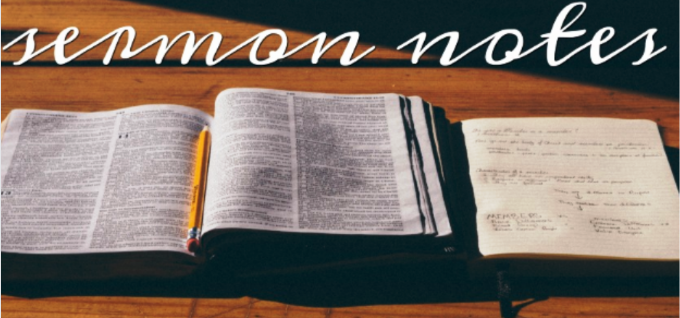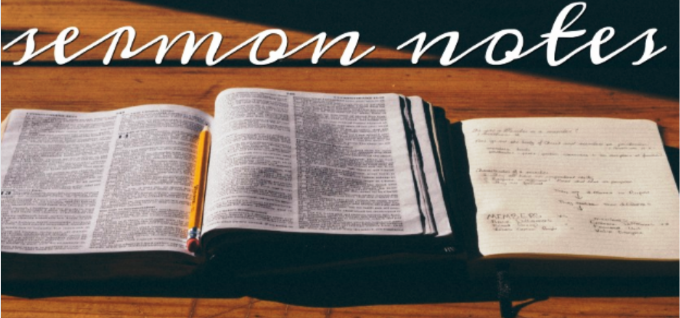
“Do Not Give Up and Do Not Be Afraid”
Father Peter Fitzgibbons
November 16 – 17, 2024
Gospel: Mark 13:24-32
We see, hear, and judge things according to the state of our souls and not always as they really are. People do strange things to themselves like piercing rings through the nose and other body parts the doctors and nurses tell me about. One of my favorites is when people pierce their tongues and hearing how that affects their speech. Wow, that must have been fun going in. I say to them, “I’m not trying to be offensive, but why did you do that?” “Because it makes me look pretty.” The question I would like to ask, but don’t, comes from Genesis, “Who told you that you were ugly?” Sin tells us we are ugly. No one is ugly who is in a State of Grace. Look at Saint Teresa of Calcutta and Saint John Paul II. How beautiful were they? No one is ugly unless they are in a state of sin. We judge things according to the state of our soul. Some don’t like the results of the election, and that’s fair. Some say they are going to shave their hair. You know, did you ever think about those women who lost their hair because of cancer treatments? That’s a little insensitive don’t you think? A little wrapped up in ourselves, aren’t we? We hear and see things, and some of those things may be accurate. However, we judge those things according to our interior disposition.
People talk about how bad things were before 1964. “Oh! It was terrible back in those days. “The Latin Mass was terrible!” Some say, “We have a vengeful God” and “I’ve heard sermons about fire and brimstone.” Excuse me – I was there. I grew up back then. On my Holy Card is the verse, “Then I shall go in unto the altar of God, of God, who gives joy to my youth”(Psalms 42:4). I must have had some weird people in my church because I loved the nuns, and the priests were great too. In those “bad old days,” five priests came from our small parish which no longer exists. Three still are priests, and two have passed. Where the heck were you? “We were yelled at.” I was never yelled at in church. However, our priest was French Canadian, so our Mass was in “Franglish.” When the Mass went to English, we really never knew because he had such a heavy French accent. “The Lord be with you, ehh.” “And also with you, ehh.” Father was a U.S. Army chaplain in the war and worked with paratroopers. One day a paratrooper asked him if he had ever jumped out of an airplane. Father said, “No.” Would you like to? “Yeah, okay.” So that afternoon they took him up in an airplane and out the door he went. Welcome to the Army! He was a wonderful man.
Now, the priests I had in college said, “If you screw up, you’ll be sent to Vietnam.” If you got expelled from college, guess who was waiting for you – Uncle Sam. He had a job for you, and it involved travel. Lovely. Sin has consequences. They played hard ball, but they had to – you know how boys are – you have to play hard ball. But I had wonderful nuns, brothers, and priests. I never heard any hell, fire, and brimstone. “The sisters slapped me.” Well, you probably deserved it.
The Lord tells us the end is near, and we will be judged. We do not know the day or hour when our Lord will come, but it is close and soon. If we try to have holiness of life, we should be joyful about His return. He’s going to reward our long suffering. If you have anxiety about our Lord returning, it means you have a problem. If you have done something wrong and have a guilty conscience, come see me. I can fix it. And if you think you have a sin I haven’t heard, I’ll pay you for the privilege to hear it. People ask me, “Father, what’s it like hearing confessions?” It’s like being stoned to death with popcorn. By the way, all sins are great. The difference between mortal sin and venial sin is the difference between slapping your wife and punching her. Every priest should be moved during Confession by the great love that people have when they come to say, “God, I have sinned against you, and I need Your forgiveness.” That’s what moves priests during Confession. So, come see me and come joyfully. Our Lord is coming back, and He’s going to fulfill our longing for Him. We should be joyful. Be sorrowful for all those people who do not welcome His coming and pray for them.
Part of us does not want to die because we were never meant to. However, because of the effects of Original Sin and the sins committed after Baptism it will happen. Heaven is meant as a consolation for those who are trying to love God by taking up their crosses every day and following Him. It’s an encouragement and not like “Wait till I get down there – you’re in trouble!” Remember, once everything is forgiven, it is forgotten. Satan will try to tell you it’s not. Do not be disturbed by all these things going on. Our Lord says, “I’m in charge. I’m in control. And I will come back. I will come either at Judgement or at the end of the world.” We will all probably leave this world before that. Is that a bad thing? Originally, we were not supposed to die, so it’s a bad thing. But when we die, we will go into the arms of our loving Savior. It’s an encouragement. “I know what you are going through. Stand fast. I am coming. I have not forgotten you. I will come and you will find fulfillment of your love in Me.” He is going to fill our empty arms, and He’s going to totally fill that hole in our souls that can only be filled by Him. So do not give up and do not be afraid.
How will you apply this message to your life? __________________________________
You can read all of Father Fitzgibbons’ sermons by going to AnnunciationCatholicAlbemarle.com, clicking on “Blog” then “Categories” and then “Sermon Notes.” On a cell phone: click on “Blog” and then “Menu.” Scroll to the bottom and click on “Categories.” Sermon Notes are also available on the Church’s Facebook page at OLA.Catholic.Church. Click on “Groups” and then “Sermon Notes.”


